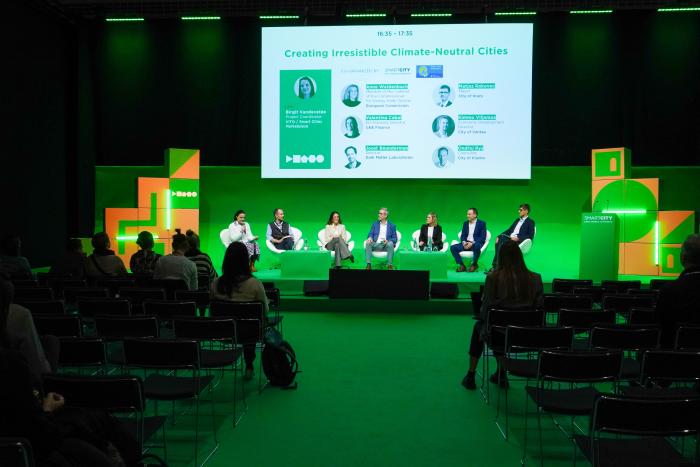
Session speakers
- Anne Weidenbach, Member of the Cabinet of the Commissioner for Energy Kadri Simson I European Commission
- Ondřej Rys, Counsellor of the city of Kladno (Czech Republic), SPARCS
- Matjaž Rakovec, Mayor of Kranj (Slovenia)
- Kimmo Viljamaa, Economic Development Director of the City of Vantaa, EIC, City of Vantaa (Finland)
- Valentina Cabal Jaramillo, EUCF, GNE Finance
- Joost Beunderman, NetZeroCities
- Birgit Vandevelde, Smart Cities Marketplace, VITO NV (Moderation)
Key take aways:
In this session, speakers from European cities and organisations discussed the pivotal role of cities in climate action. They highlighted the need for local-level initiatives and emphasised the importance of financial support. Collaboration, innovation, and citizen engagement were emphasised as key factors in achieving climate goals. The session underscored the critical role of cities in driving sustainable urban development.
Key Points:
- The session featured speakers from various European cities and organisations, including Anne Weidenbach from the European Commission, Ondřej Rys from the City of Kladno, Matjaž Rakovec from the City of Kranj, Kimmo Viljamaa from the City of Vantaa, Valentina Cabal Jaramillo from GNE Finance, Joost Beunderman from NetZeroCities, and Birgit Vandevelde from VITO NV. There were approximately 70 attendees present.
- City-Led Climate Action: Cities are at the forefront of climate action, leveraging their strategic advantage to drive positive change. The European Green Deal serves as a guiding principle for legal initiatives, and tools like the Smart Cities Marketplace and Covenant of Mayors are crucial for implementing sustainable practices at the local level.
- Local Impact and Global Significance: Anne Weidenbach emphasised that all change begins at the local level and has a global impact. She highlighted the importance of swift action in the green transition and the significant role of local and regional levels in achieving climate goals.
- Visions of Transition: Speakers from Kladno, Kranj, and Vantaa shared their respective cities' visions for transitioning from carbon-dependent histories to green, sustainable futures. Each city is actively working on initiatives related to climate neutrality, adaptation to climate change, and efficient resource utilisation.
- Importance of Financial Support: The European City Facility (EUCF) was highlighted as a critical resource for cities to implement their climate change plans. Financial support and direct assistance are crucial for realising these ambitious goals.
- Collaboration and Innovation: Collaboration among stakeholders, including citizens, companies, and infrastructure owners, was emphasised as essential for achieving climate goals. Innovation in city planning, building development, and finance are key components of successful climate initiatives.
- Challenges in Financing: Cities face challenges in accessing funding due to a lack of internal skills. It was suggested that cities need full political commitment and a willingness to collaborate with private funders. Blended finance schemes and stepping out of comfort zones are important strategies.
- Alignment of Policy Levels: A whole municipal approach was advocated, where every department considers climate impacts in their spending decisions. Integration with local and regional development strategies was stressed for achieving meaningful progress.
- Citizen Engagement: Engaging citizens in climate initiatives is crucial for success. A shared vision of a sustainable, high-quality life should guide climate actions.
- Cross-City Collaboration: Collaboration across city boundaries, especially with capital cities, was highlighted as a positive force in driving climate action. Examples include Vantaa's collaboration with Helsinki and Kladno's efforts to improve transportation links with Prague.
- Ongoing Pilot Projects: Various cities mentioned ongoing projects, underscoring the importance of continued collaboration and knowledge sharing among cities.
- Overall, the session emphasised the critical role of cities in achieving climate neutrality and the need for collaboration, innovation, and financial support to make sustainable urban development irresistible for all stakeholders.
Quotes:
"We propose increased targets that are interesting for both regional and local levels. Whatever we do, we need to join forces to make it happen."
(Anne Weidenbach, Member of the Cabinet of the Commissioner for Energy Kadri Simson I European Commission)
"Within our mission of actions, we have a few key sectors: mobility and transportation, energy, waste economy, green infrastructure and built environment and the production of food, which is the main contributor to greenhouse gas emissions."
(Matjaž Rakovec, Mayor of Kranj (Slovenia)
"It is essential to work with collaborations and stakeholders. The role of cities is to motivate people, in order to be able to reach the goal of innovation."
(Ondřej Rys, Counsellor of the city of Kladno (Czech Republic, SPARCS)
"We need to achieve our ambitious goal; we need collaboration and we may need more strict city planning targets. We must provide new ideas for the others to take as well and have approaches to bring people to work together."
(Kimmo Viljamaa, Economic Development Director of the City of Vantaa, EIC, City of Vantaa (Finland))
"Cities have a lot of responsibility in their fields but one thing, we think is still missing is political commitment."
(Valentina Cabal Jaramillo, EUCF, GNE Finance)
"A climate transition also means an economic transition, so we genuinely need a whole municipality approach. Building the visions of the good life is particularly important. Citizens must be able to believe it to participate."
(Joost Beunderman, NetZeroCities)
